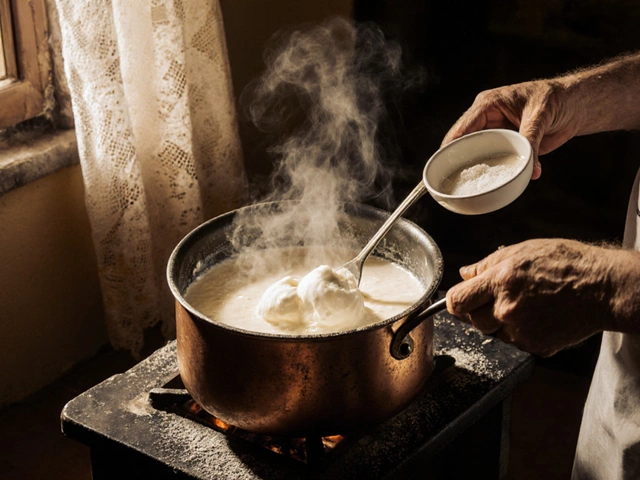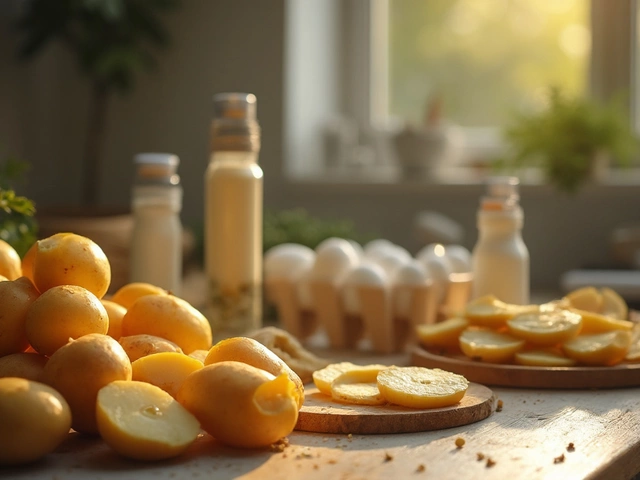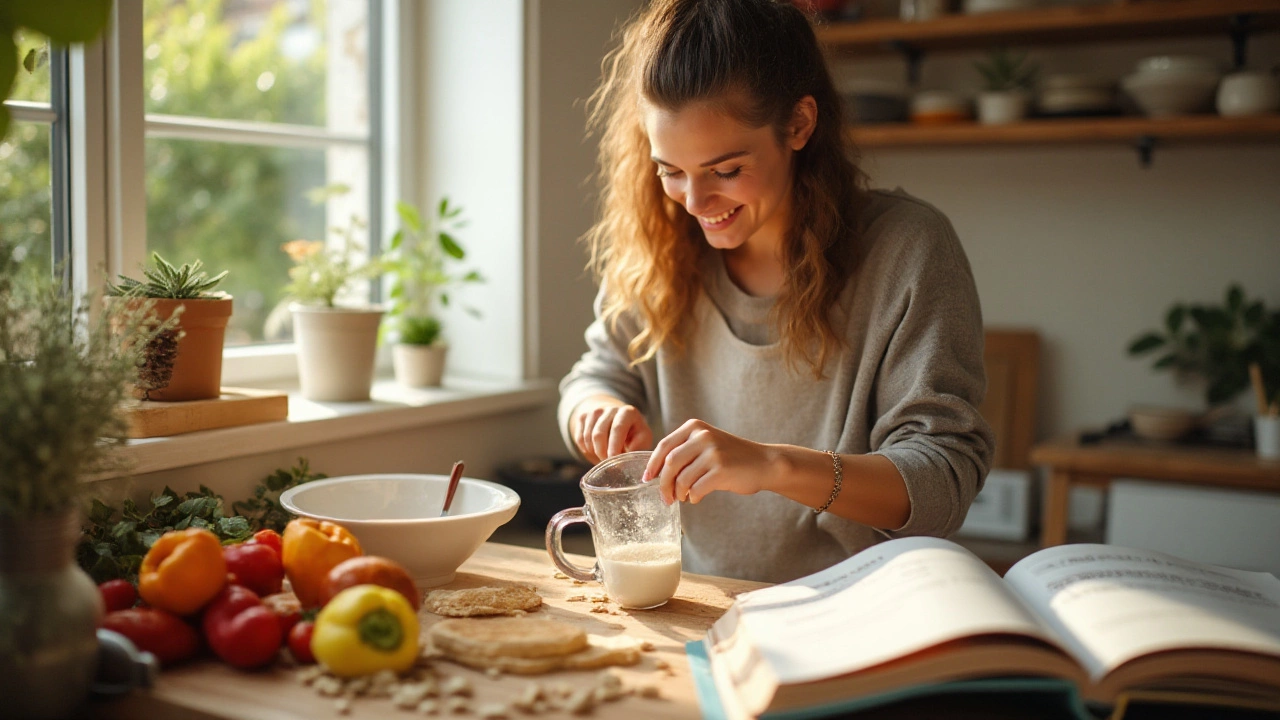
There’s a delightful misconception that vegan diets eliminate the possibility of indulging in delicious baked goods. With today's growing awareness and creativity, plant-based eaters can indeed enjoy a variety of sweet treats.
The secret lies in clever ingredient substitutions that maintain the flavor and texture people love. By swapping out a few key animal-derived components, your favorite dessert recipes can become wonderfully vegan.
This adventure into vegan baking not only promises satisfaction for your sweet tooth but also opens doors to healthful, ethical, and environmentally friendly choices. Let us guide you through this journey of delectable possibilities that even the most seasoned bakers will adore.
- Demystifying Vegan Baking Ingredients
- Substituting Eggs and Dairy in Recipes
- Exploring Popular Vegan Baked Treats
- Baking Tips for Beginners
- Embracing Flavors and Textures
- Environmental and Ethical Benefits
Demystifying Vegan Baking Ingredients
When stepping into the world of vegan desserts, understanding ingredient alternatives becomes essential. Many believe that the absence of traditional components like eggs and butter can lead to blandness or unsatisfying results. However, the truth could not be further from this assumption. A range of plant-based baking alternatives opens a world of unique flavors and textures, making vegan recipes nothing short of delightful. By embracing ingredients like flax seeds, chia seeds, and coconut oil, you can create marvelous treats that align with a cruelty-free lifestyle.
Flax seeds and chia seeds work excellently as egg substitutes, offering binding properties that mimic eggs. Simply mix one tablespoon of flaxseed meal with three tablespoons of water, let it sit for a while, and voila, you've got an 'egg' ready for baking. Similarly, chia seeds create a gel-like consistency when mixed with water, ideal for holding your batter together. Bake with confidence knowing these small but mighty seeds are doing their magic.
According to the Vegan Society, "The flexibility of plant-based cooking is remarkable, and the range of alternatives available to substitute animal-derived ingredients is ever-growing."
Butter presents another puzzle for aspiring vegan bakers. Many are unaware of the excellent substitutes available that can easily replace traditional butter without compromising richness. Options like coconut oil, vegetable shortening, and even avocado can provide the desired creaminess. Coconut oil, with its mild flavor, often works as a one-to-one replacement for butter, while avocado offers a unique twist with its natural creaminess and subtle taste—perfect for muffins or cakes where moisture is key.
Sweeteners, too, offer room for plant-based creativity. Maple syrup, agave nectar, and even mashed fruits like bananas or applesauce bring sweetness and moisture to vegan baked goods. They not only add flavor but also contribute to the binding process. A table of substitutions can be helpful in understanding quantities:
| Non-Vegan Ingredient | Vegan Substitute |
|---|---|
| 1 Egg | 1 tbsp Flaxseed Meal + 3 tbsp Water |
| Butter | Coconut Oil or Avocado |
| Honey | Maple Syrup or Agave Nectar |
Finally, don't shy away from experimenting with plant-based milks—such as almond, soy, or oat milk—and non-dairy yogurts that offer creaminess to your batter. These substitutes are widely available and provide various flavors, from nutty to creamy, enhancing the richness of any dessert. As vegan-friendly desserts grow in popularity, more innovative products and ideas emerge, propelling the plant-based baking revolution further. Opting for vegan baking ingredients doesn't limit you; it's an invitation to explore a diverse and delicious culinary landscape.
Substituting Eggs and Dairy in Recipes
Finding the right substitutes for eggs and dairy is the cornerstone of mastering vegan baking. These substitutions aren't just about mimicking the function of these ingredients but also about maintaining the delectable flavor and texture that people expect from their favorite baked goods. Eggs often act as a binder in recipes, providing structure, while also contributing moisture and richness. In the realm of vegan baking, the magic of plant-based ingredients can effectively replicate these roles, opening up a world of creative possibilities.
One of the most popular egg substitutes is the chia or flaxseed 'egg'. To make this, mix one tablespoon of chia or flax seeds with three tablespoons of water and let it sit until it forms a gel-like consistency. This is perfect for holding ingredients together in recipes like cookies and cakes. Another alternative is applesauce or mashed bananas, where a quarter cup can replace one egg, adding moisture and a touch of sweetness to your vegan desserts. For those who prefer a store-bought option, there are several commercial egg replacers available that are convenient and easy to use.
Replacing dairy, especially milk and butter, in baking, has also become much simpler, thanks to the wide range of plant-based options available. Almond, soy, and oat milk are popular choices, offering different flavor profiles and nutritional benefits. When using these, simply swap them in a one-to-one ratio with regular milk. For butter, you might turn to vegan margarine, or for a more wholesome approach, use coconut oil which adds a lovely aroma to cakes and cookies. A surprising substitute is avocado, with its creamy texture, it can replace butter in recipes for brownies and similar treats.
"There's immense joy in experimenting with vegan baking; realizing that every plant-based ingredient offers a unique twist," notes vegan pastry chef Aisha Adams. "Start simple, and soon you'll find your kitchen bursting with delightful aromas."
For those keen on exploring these substitutes, a simple experiment can be a transformational experience. Imagine your plant-based baking journey as both a culinary adventure and an insightful discovery. Explore each ingredient's unique qualities and find what works best for your palate and preferences. It's not just about making a straightforward swap, but an art of crafting flavors that embody the spirit of creativity and sustainability. With practice, even novice bakers will find themselves adept at creating vegan alternatives that surprise and satisfy.
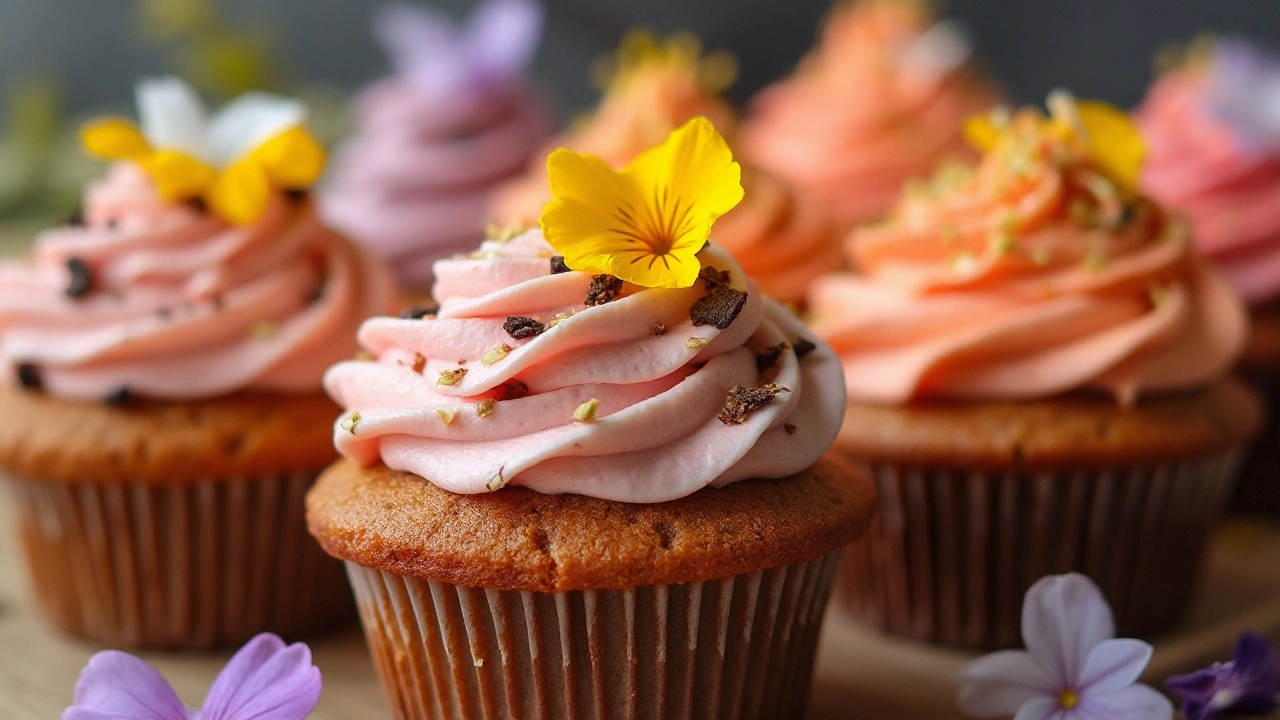
Exploring Popular Vegan Baked Treats
When you imagine a world of indulgent vegan desserts, fresh-out-of-the-oven muffins, gooey brownies, and perfectly crisp cookies are undeniably contenders. Vegan baking has taken culinary circles by storm, with traditional favorites being reimagined through a plant-based lens. For those just dipping their toes into vegan cooking or long-time enthusiasts alike, vegan baked goods provide a refreshing way to enjoy all those classic flavors without any of the guilt. A number of ingenious plant-based baking enthusiasts have tackled timeless recipes, substituting traditional animal-sourced ingredients with cleverly derived plant-based alternatives.
Let's start with brownies, a universally beloved treat. In vegan baking, flaxseeds or chia seeds often replace eggs due to their binding properties. By mixing one tablespoon of ground seeds with three tablespoons of water, bakers can create a pasty blend that mimics the texture provided by eggs. The result is a wonderfully fudgy brownie that keeps its structure without compromising on taste. The rich, chocolatey flavor remains intact, delivering the satisfaction any chocoholic desires.
Moving on to muffins, which can easily become a vegan recipe favorite. Instead of dairy milk, unsweetened almond or oat milk offers a creamy base that enhances the moisture and stability of the batter. Coconut oil or applesauce can also take the place of butter, lending a light and fluffy texture to these delectable morning treats. Let's not forget the magic of spices and fruit – from banana and cinnamon to zesty lemon and poppy seeds, the possibilities are endless and utterly delicious.
For cookie lovers, the transition to veganism does not entail a farewell to their dear friend, the cookie jar. Coconut or vegetable shortening can replace butter without disappearing into the dough. Dark chocolate chips free of milk solids further sweeten the equation. For a healthier twist, bakers might use coconut sugar or maple syrup in place of regular sugar, contributing to both the texture and flavor profile with minimal impact on taste.
"Vegan baked goods can truly embody the same delectable qualities as their non-vegan counterparts," shares Emma George, a renowned vegan chef. "With the right ingredients and creativity, the skies the limit."
Additionally, cupcakes and sheet cakes have found their way into vegan hearts. Apple cider vinegar and baking soda act together as a traditional egg substitute, helping those cupcakes rise to fluffy perfection. Vegan-friendly desserts do not fall short on icing options either, with cashew cream and coconut whipped cream emerging as widely embraced alternatives to traditional buttercream. Often, almond flour or other gluten-free options are used, making it accessible for individuals with multiple dietary preferences.
The variety vegan baking offers extends beyond the ingredients. It beckons inviting aromas as kitchens transform into hubs of creativity and flavor. Increasingly, these treats are celebrated not just for their dietary ethics but for their ability to stand on their own – deliciously. Whether you're hosting a vegan dinner party or finding joy in an afternoon of indulgent baking, the expansion of plant-based baked goods ensures no sweet tooth shall be left unsatisfied.
Baking Tips for Beginners
Embarking on a journey into the art of vegan baking can seem daunting at first, but with a touch of curiosity and a sprinkle of patience, anyone can craft delectable vegan desserts. The key is to start small and build your confidence with straightforward recipes that allow you to experiment and learn. A good starting point is to familiarize yourself with the primary ingredients used in plant-based baking, as these significantly influence the texture, flavor, and density of your baked creations.
One important aspect of vegan baking is understanding how to replace traditional baking ingredients like eggs and dairy. Eggs, for instance, which provide structure and leavening, can be substituted with applesauce, mashed bananas, or flaxseed meal mixed with water, each offering varying moisture levels and binding strength. As for dairy, plant-based milks—such as almond, soy, or oat milk—can easily replace cow's milk, while coconut cream or vegetable oil can stand in for butter. These substitutions are not only healthier but also incredibly easy to integrate into your baking process.
Now, once your ingredient pantry is ready, the actual baking process deserves attention. Timing, for example, is crucial. Vegan baked goods may require different baking times compared to their non-vegan counterparts. It's essential to monitor the bake closely and be prepared to make adjustments. Another tip is to invest in quality baking tools, which can tremendously impact your results. A reliable set of measuring cups, spoons, and a kitchen scale can ensure precision, vital for baking success. Baking is indeed a science as much as it is an art, and precision is your best friend in achieving consistent results.
Additionally, always remember to taste and tweak your recipes as you go. Vegan baking provides a canvas to explore an array of flavors and textures. Don't hesitate to incorporate nuts, seeds, or spices into your desserts for added complexity. Trial and exploration will lead you to discover combinations that resonate with your palate. Paired with a few well-observed practice sessions, you’ll find that vegan baking becomes second nature.
"In vegan cooking, the best part is you don't have to follow the rules. Once you learn the science, you get to be as creative as you want." - Isa Chandra Moskowitz, Renowned Vegan Chef
One fascinating fact to consider is the environmental and ethical boost from choosing plant-based ingredients, which tend to have a smaller carbon footprint compared to animal-derived products. According to a recent study by the University of Oxford, embracing a vegan lifestyle can reduce an individual's carbon footprint from food by up to 73%. This bit of knowledge not only reinforces the importance of plant-based baking but also inspires you to continue exploring this compassionate culinary practice.
Now, let’s talk about presentation. How you present your desserts can significantly alter the dining experience. Take an extra moment to arrange your baked goodies with flair, and consider pairing them with homemade plant-based sauces or creams. Even a sprinkle of powdered sugar or a drizzle of dark chocolate can elevate a simple dessert into a masterpiece. This finishing touch can make a world of difference and leave a lasting impression on your guests.
Finally, keep in mind that mistakes are all part of the learning process. Every failed experiment is a step closer to mastery. Keep a journal of your trials, noting what worked and what didn’t. With practice, patience, and a touch of creativity, you'll soon become adept at creating vegan baked goods that you and your loved ones will cherish. Thus, savor each moment in the kitchen, for it’s a journey as fulfilling as the desserts you'll delight in.
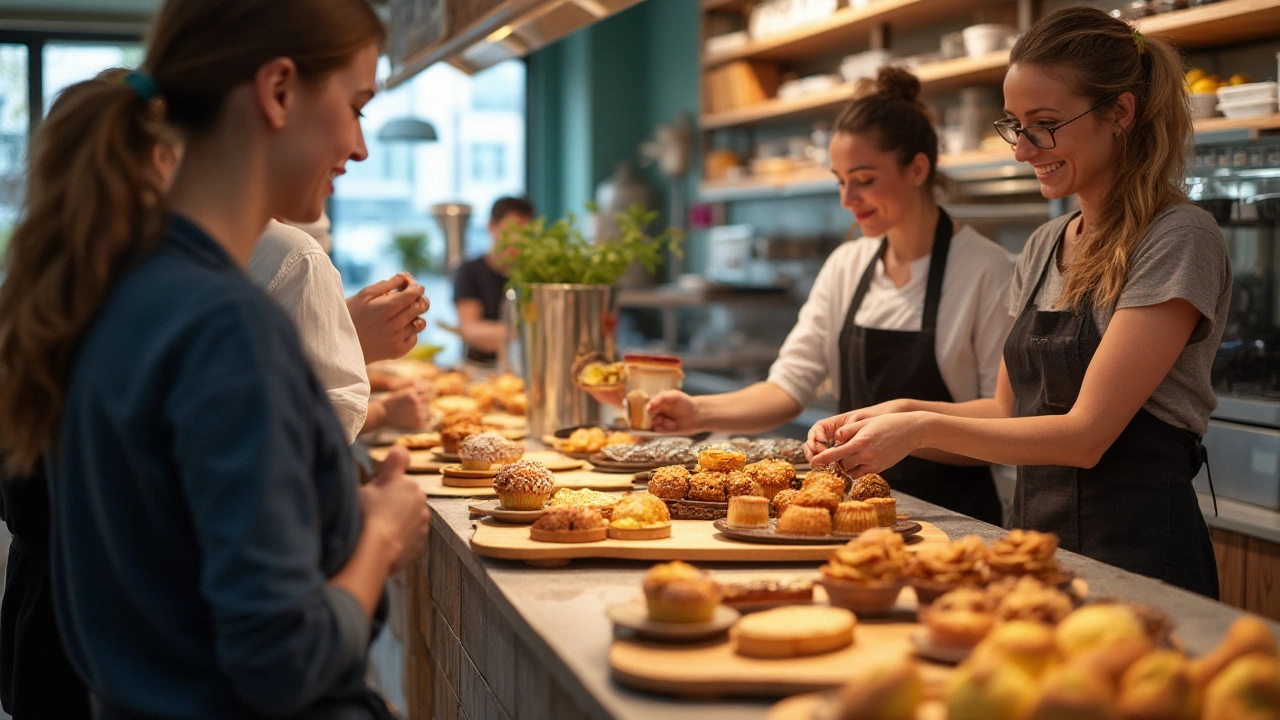
Embracing Flavors and Textures
One of the most enticing aspects of vegan baking is its dynamic transformation of flavors and textures. The absence of animal products doesn’t mean a compromise on taste or the tactile experience of eating a delightful dessert. Instead, it offers an opportunity to innovate with fresh and exciting ingredients. Imagine biting into a vegan dessert, where the soft crumb melts in your mouth, releasing a symphony of flavors. Achieving this effect involves knowing the secret ingredients to enhance both taste and texture.
Traditional baked goods often rely on eggs and dairy to create a creamy texture and rich flavor, but vegan alternatives can deliver similar results. For instance, consider the magic of aquafaba—the viscous liquid from chickpeas. It’s an excellent egg substitute that can be whipped into peaks, ideal for creating airy cakes or light meringues. Similarly, the creamy richness that dairy provides can easily be achieved with coconut cream or almond milk. Each of these substitutes brings its own unique flavor profile to the table while ensuring that the final product retains its integrity.
Exploring flavors in plant-based baking introduces bakers to a world of natural sweetness and spices. Maple syrup or agave nectar provides a luscious sweetness with a hint of complexity, unsuitable for processed sugars. Meanwhile, spices like cinnamon, nutmeg, and ginger can be infused to amplify both aroma and flavor. Don’t hesitate to experiment with seasonal fruits and vegetables to enrich the taste—who knew that zucchini could make a cake moister or that beets bring an earthy sweetness to brownies?
"The best vegan cooking is an art form that delights with every unexpected turn," says Clare Platt, a renowned plant-based chef. Her perspective underscores the thrill of discovery that vegan baking can provide.
Textures, similarly, can be adapted and celebrated in vegan baking. Bakers often use nut flours such as almond or coconut to create denser, more filling treats. Alternatively, for something fluffier, oat flour or a blend of gluten-free options might be the way to go. Textures are such an essential element of baked goods, and it’s exciting to know they can be achieved through experimentation and a bit of daring in the kitchen. Knowing how to balance these elements can elevate a simple treat into something memorable and utterly delectable.
It’s worth noting an emerging trend where bakers embrace naturally derived thickeners and stabilizers, such as chia seeds or ground flaxseeds. When mixed with water, both these seeds create a gelatinous texture that works phenomenally well in desserts requiring a binding agent. Vegan baking invites discovery at every corner by using simple, natural components with pronounced textures.
Environmental and Ethical Benefits
Switching to vegan desserts and baked goods not only delights the taste buds, but also offers significant environmental and ethical upsides. The journey of food production has an immense impact on our planet. Traditional baking often relies heavily on animal products, which contribute to heightened carbon footprints, deforestation, and increased water consumption. In contrast, embracing plant-based ingredients in your baked creations can dramatically reduce these environmental pressures. For example, producing just one liter of cow's milk requires about 1,000 liters of water, while almond or oat milk demands significantly less. By choosing plant-based baking, you consciously make a choice that favors a more sustainable future for our planet.
From ethical perspectives, vegan baking aligns with cruelty-free living, as it eliminates the exploitation of animals in the food supply chain. This resonates with the growing movement towards humane treatment of animals. As consumers become more aware of factory farming conditions, the push for plant-based alternatives has grown substantially. According to a 2023 study, the vegan population in the UK alone increased by over 20% compared to previous years. "Veganism is not just a diet, but a philosophy that aims to avoid complicity in animal suffering," notes the respected author and activist, Peter Singer. Many individuals find that aligning their dietary choices with their ethical beliefs provides a sense of harmony and peace.
Increased adoption of vegan baking also correlates with the reduced use of antibiotics and hormones prevalent in non-vegan agricultural practices. This shift points to a broader public health benefit by lowering the risks associated with such residues in food products. The ripple effect of such choices also includes a decrease in the prevalence of certain health issues tied to high animal product consumption, such as heart disease and cholesterol-related conditions. These personal health advantages support the ethical foundation of vegan living, further solidifying its position as a viable lifestyle choice.
Economic factors also play a role in promoting vegan recipes. The demand for ethically sourced products encourages innovation and variety in the food market. As a result, more small businesses and startups focus on unique, sustainable ingredients that offer both quality and taste. This stimulates local economies and creates opportunities for communities to thrive on shared ethical and environmental values. Supporting these businesses not only benefits the environment but also reinforces a collective effort toward a more equitable food system.
| Ingredient | Water Use (Liters) | Carbon Emission (kg CO2) |
|---|---|---|
| Cow's Milk | 1000 | 3.2 |
| Almond Milk | 370 | 0.7 |
| Oat Milk | 48 | 0.9 |
In conclusion, the environmental and ethical benefits of vegan desserts extend beyond personal health to encompass global responsibilities. Choosing vegan options in baking signifies a commitment to the well-being of our planet and its inhabitants. As this movement grows, it fosters solutions that are not only beneficial but essential for a sustainable future. Embrace the change, indulge in compassionate treats, and be part of the solution in shaping a better world.




